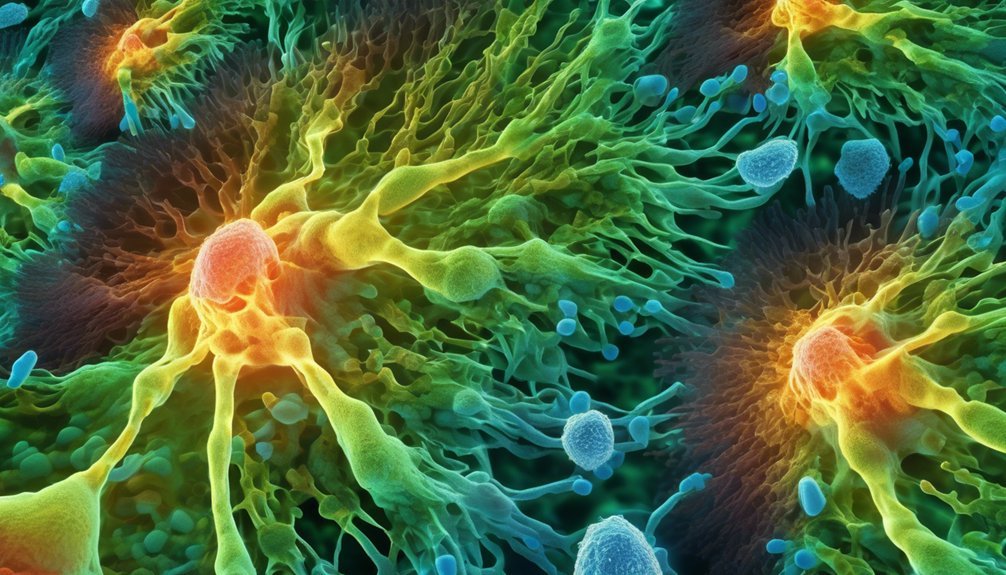To build an anti-cancer lifestyle, you need to make conscious choices that support your well-being. By focusing on aspects like nutrition, exercise, stress management, sleep, and avoiding harmful behaviors, you can create a foundation for a healthier future. But there's more to it than just these basics. Exploring the interconnected ways in which lifestyle factors can impact cancer risk may offer valuable insights into crafting a truly holistic approach to disease prevention and overall health.
Key Takeaways
- Nutrient-rich diet, high in antioxidants.
- Regular physical activity to boost immunity.
- Stress management through mindfulness practices.
- Prioritize quality sleep for cellular repair.
- Avoid harmful habits like smoking and excessive alcohol.
Importance of Diet
When it comes to building an anti-cancer lifestyle, one of the key pillars is the importance of diet. Consuming nutrient-rich foods is essential in supporting your body's natural defense mechanisms against cancer. These foods are packed with vitamins, minerals, and antioxidants that can help strengthen your immune system and reduce inflammation, both of which play a crucial role in fighting cancer.
Incorporating cancer-fighting recipes into your daily meals can make a significant difference in your overall health. Consider adding more fruits and vegetables to your diet, especially those with vibrant colors like berries, leafy greens, and carrots. These foods are rich in phytochemicals that have been shown to have anti-cancer properties.
Additionally, including whole grains, nuts, seeds, and lean proteins can provide your body with the necessary nutrients to thrive and combat potential cancer risks.
Power of Physical Activity
To truly harness the power of physical activity in your anti-cancer lifestyle, it's crucial to understand its profound impact on your overall well-being. Engaging in regular exercise brings a host of benefits that can help in cancer prevention and management. Here are some key points to consider:
- Exercise Benefits:
- Regular physical activity can boost your immune system, making your body better equipped to fight off cancer cells.
- Exercise helps regulate hormone levels, reducing the risk of hormone-related cancers like breast and prostate cancer.
- Physical activity can improve circulation and promote oxygen flow throughout your body, creating an environment that's less conducive to cancer growth.
- Maintaining a healthy weight through exercise can lower the risk of developing various types of cancer.
Consider incorporating movement therapy such as yoga or tai chi into your routine, as these activities not only provide physical benefits but also contribute to mental well-being.
Embracing the power of physical activity is a proactive step towards a healthier, anti-cancer lifestyle.
Stress Management Techniques

Harnessing stress management techniques is a vital component of cultivating an anti-cancer lifestyle. Incorporating meditation techniques and breathing exercises into your daily routine can help you manage stress effectively.
Meditation techniques, such as mindfulness meditation, have been shown to reduce stress levels and promote a sense of calmness. By taking a few minutes each day to focus on your breath and be present in the moment, you can lower your stress hormone levels, which in turn can have a positive impact on your overall health.
Breathing exercises, like deep diaphragmatic breathing, can also help in managing stress. When you feel overwhelmed, taking deep breaths and focusing on your inhales and exhales can activate the body's relaxation response, reducing tension and promoting a sense of relaxation.
Incorporating these stress management techniques into your daily routine can't only help you cope with the challenges of life but also contribute to a holistic anti-cancer lifestyle. Remember, taking care of your mental well-being is just as important as taking care of your physical health.
Benefits of Adequate Sleep
In today's fast-paced world, prioritizing adequate sleep is crucial for maintaining a healthy lifestyle and reducing the risk of various health conditions, including cancer. Quality and duration of sleep play a significant role in your overall well-being. Here are some benefits of adequate sleep:
- Enhanced Immune Function: Quality sleep supports your immune system, helping your body fight off illnesses, including cancer.
- Improved Cognitive Function: A good night's rest enhances memory, focus, and decision-making skills, enabling you to function at your best.
- Regulated Hormones: Proper sleep duration helps regulate hormones responsible for appetite control and metabolism, which can impact cancer risk.
- Cellular Repair: During deep sleep stages, the body repairs and rejuvenates cells, aiding in overall health and potentially reducing the risk of cancer development.
Prioritizing adequate sleep is a simple yet powerful way to support your body in its fight against cancer and other health conditions. Remember, your body deserves the rest it needs to function optimally.
Harmful Habits to Avoid

One detrimental factor that can significantly impact your risk of cancer and overall well-being is engaging in harmful habits. Smoking cessation is crucial in reducing the risk of various types of cancer, including lung, throat, and mouth cancers. Smoking not only damages your lungs but also increases inflammation in the body, making it more susceptible to cancer growth. By quitting smoking, you're taking a vital step towards improving your health and preventing cancer.
Another harmful habit to avoid is excessive sugar consumption. Diets high in sugar have been linked to an increased risk of certain cancers, such as breast, colon, and pancreatic cancer. Sugary foods and beverages can contribute to inflammation, weight gain, and insulin resistance, all of which can promote cancer development.
Making healthier food choices and reducing your sugar intake can help lower your cancer risk and improve your overall well-being. Remember, small changes in your habits can lead to significant benefits for your health in the long run.
Importance of Regular Screenings
During routine medical check-ups, healthcare professionals may recommend various screenings to detect cancer early. Early detection plays a crucial role in successful cancer treatment. By undergoing regular screenings, you're taking a proactive approach to your health, allowing for timely interventions if any abnormalities are found.
Preventative care through screenings can help catch cancer at its earliest stages when it's most treatable, improving your chances of a full recovery. Here are some important reasons why regular screenings are vital for maintaining your health:
- Early Detection: Screenings can detect cancer before symptoms appear, increasing treatment success rates.
- Preventative Care: Regular screenings can help identify potential risks early, enabling proactive measures to be taken.
- Peace of Mind: Knowing that you're taking steps to monitor your health can reduce anxiety and promote overall well-being.
- Personalized Care: Screenings allow healthcare providers to tailor your care based on your individual risk factors and needs.
Benefits of Sun Protection

When it comes to protecting your skin from the harmful effects of the sun, incorporating sun protection measures into your daily routine is essential. Sunscreen offers significant benefits in shielding your skin from harmful UV exposure, thereby reducing the risk of skin cancer. By applying sunscreen regularly, you create a barrier that helps prevent the damaging effects of the sun's ultraviolet rays, which are known to contribute to skin cancer development.
While it's important to protect yourself from UV exposure, it's also crucial to maintain adequate levels of vitamin D. Some sun exposure is necessary for your body to produce vitamin D, which plays a vital role in maintaining bone health and supporting your immune system. Finding a balance between sun protection and allowing for safe sun exposure is key to reaping the benefits of sunlight while minimizing the risk of skin cancer.
Role of Environmental Factors
Environmental factors play a significant role in shaping our health outcomes, including the risk of developing cancer. Being mindful of the impact of factors such as air pollution and chemical exposure is crucial for reducing the risk of cancer. Here are some key points to consider:
- Air Pollution: Polluted air contains harmful substances like fine particles and toxic gases that can damage cells in your body, potentially leading to cancer.
- Chemical Exposure: Exposure to certain chemicals in everyday products like cleaning agents, pesticides, and personal care items can increase the risk of cancer over time.
- Indoor Environments: Poor indoor air quality due to factors like mold, tobacco smoke, and volatile organic compounds can also contribute to cancer risk.
- Occupational Hazards: Certain workplaces may expose individuals to carcinogenic substances, emphasizing the importance of proper safety measures and protective equipment.
Importance of Hydration

Staying properly hydrated is a fundamental aspect of maintaining overall health and well-being. Water consumption plays a vital role in supporting various bodily functions, including digestion, circulation, temperature regulation, and nutrient absorption. Adequate hydration is especially crucial for preventing illnesses and promoting overall wellness.
To ensure you're staying hydrated, consider these hydration tips:
- Carry a reusable water bottle with you throughout the day to track your water intake easily.
- Aim to drink at least 8-10 cups of water daily, adjusting based on your activity level and climate.
- Incorporate hydrating foods like fruits and vegetables into your diet to supplement your water intake.
- Listen to your body's signals of thirst and prioritize drinking water when you feel parched.
- Limit your consumption of sugary and caffeinated beverages, as they can contribute to dehydration.
Benefits of Mindfulness Practices
Utilizing mindfulness practices can have a profound impact on both your mental and physical well-being. Mindfulness meditation and yoga practice are two powerful tools that can help you cultivate a sense of awareness and presence in your everyday life. Here are some benefits of incorporating these practices into your routine:
- Stress Reduction: Mindfulness practices have been shown to reduce stress levels, which can be beneficial in preventing the negative effects of chronic stress on the body.
- Improved Emotional Well-being: By practicing mindfulness, you can enhance your emotional regulation skills, leading to a greater sense of calm and stability in the face of life's challenges.
- Enhanced Focus and Concentration: Mindfulness meditation has been linked to improved cognitive function, including better focus and concentration, which can be beneficial in various aspects of your life.
- Better Sleep Quality: Engaging in mindfulness practices like yoga before bedtime can help calm the mind and body, leading to improved sleep quality and overall well-being.
Importance of Social Connections

Incorporating strong social connections into your life is crucial for maintaining overall well-being and health. Supportive relationships can provide comfort, reduce stress, and boost your immune system. Community involvement not only creates a sense of belonging but also offers opportunities to give back and support others, which can bring immense fulfillment and purpose to your life.
| Importance of Social Connections | ||
|---|---|---|
| Benefits | Ways to Incorporate | Impact on Health |
| Enhanced emotional well-being | Join clubs or groups | Lower risk of depression |
| Increased sense of belonging | Volunteer in your community | Strengthened immune system |
| Improved self-esteem | Attend social events | Reduced stress levels |
| Greater life satisfaction | Connect with friends and family | Longer lifespan |
| Support during tough times | Engage in group activities | Improved overall well-being |
Benefits of Limiting Alcohol
When it comes to enhancing your overall well-being and health, another important aspect to consider is the benefits of limiting alcohol consumption. Making strides towards alcohol moderation can significantly impact your health and reduce the risk of cancer. Here are some key benefits of limiting alcohol:
- Reduced Cancer Risk: Excessive alcohol consumption has been linked to an increased risk of various types of cancer, including breast, liver, and colorectal cancer.
- Improved Liver Health: Limiting alcohol intake helps in preserving liver function and reducing the likelihood of developing liver diseases such as cirrhosis.
- Enhanced Mental Well-being: Lower alcohol consumption is associated with better mental health outcomes, reducing the risk of depression and anxiety.
- Better Sleep Quality: Cutting back on alcohol can lead to improved sleep patterns, helping you feel more refreshed and energized throughout the day.
Frequently Asked Questions
How Can Genetics Impact Cancer Risk?
Genetics can play a significant role in cancer risk. If you have a genetic predisposition to certain types of cancer, such as BRCA mutations for breast cancer, your risk may be higher. However, lifestyle modifications can still make a difference.
Are There Specific Foods to Avoid for Cancer Prevention?
When it comes to cancer prevention, it's crucial to be mindful of your diet. Processed foods high in additives and preservatives can increase inflammation in your body, potentially raising your cancer risk.
Similarly, excessive sugar consumption can fuel cancer cell growth. Opt for whole, nutrient-rich foods like fruits, vegetables, whole grains, and lean proteins to support your overall health and reduce the likelihood of developing cancer.
Your choices today can impact your tomorrow.
Can Certain Supplements Help Prevent Cancer?
Certain supplements, like Vitamin D and green tea, have shown potential in cancer prevention. Research suggests that Vitamin D may play a role in reducing cancer risk, while green tea contains antioxidants that could help protect cells from damage.
It's important to consult with a healthcare provider before incorporating supplements into your routine, as individual needs vary. Maintaining a balanced diet rich in nutrients remains key for overall health and well-being.
Is There a Link Between Cancer and EMF Exposure?
Excessive EMF exposure, like that from electronic devices, is a concern due to potential radiation effects. While research is ongoing, some studies suggest a link between EMF dangers and certain types of cancers. To minimize risks, consider limiting your exposure to EMF sources, such as using devices at a safe distance and turning them off when not in use. Being mindful of EMF exposure can be a proactive step in promoting overall health and well-being.
What Role Do Hormones Play in Cancer Development?
Hormones are like the conductors of a symphony, orchestrating various bodily functions. Hormone imbalance can disrupt this harmony, potentially fueling cancer development. In some cases, hormone therapy is used to regulate these levels.
When hormones go awry, they can influence cell growth, potentially leading to cancer. Understanding how hormones play a role in cancer development is crucial for managing and preventing this disease.
Conclusion
So, there you have it! By nourishing your body with nutrient-rich foods, moving your body regularly, managing stress like a zen master, catching those Z's, steering clear of harmful habits, staying hydrated, practicing mindfulness, cultivating meaningful connections, and sipping on that mocktail instead of a cocktail, you're well on your way to building an anti-cancer lifestyle. Keep up the good work, rockstar!





